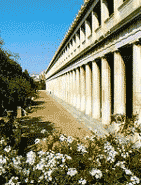 Athens, historic city and capital of Greece. Athens is generally considered to be the birthplace of Western civilization, and many of classical civilization's intellectual and artistic ideas originated there.
Athens, historic city and capital of Greece. Athens is generally considered to be the birthplace of Western civilization, and many of classical civilization's intellectual and artistic ideas originated there. Athens lies 5 miles (8 km) from the Bay of Phaleron, off the Aegean Sea, where its port, Piraeus, is situated. The Hymettos Mountains separate it from Petalion Bay to the east. The seasonal Kifisos River flows through western Athens, and the Ilisos River crosses the eastern half. Greater Athens forms a region of modern Greece. The climate is temperate, with mild winters and hot, dry summers.
Athens is the hub of Greek merchantile business, both import and export. Tourism, shipping, and publishing are of major importance, as are the production of textiles,
 pottery, and alcoholic beverages. The mining of marble and bauxite in the area is significant. Athens is best known for its temples and public buildings of antiquity. Chief among these is the Parthenon, a columned, rectangular temple built for the city's patron goddess, Athena; it is considered to be the culmination of the Doric order of classical Greek architecture. Also located on the Acropolis are the Erechtheum, originally the temple of both Athena and Poseidon, and the Propylaea,
pottery, and alcoholic beverages. The mining of marble and bauxite in the area is significant. Athens is best known for its temples and public buildings of antiquity. Chief among these is the Parthenon, a columned, rectangular temple built for the city's patron goddess, Athena; it is considered to be the culmination of the Doric order of classical Greek architecture. Also located on the Acropolis are the Erechtheum, originally the temple of both Athena and Poseidon, and the Propylaea,  the entrance of which is through the wall of the Acropolis. At the foot of the Acropolis, to the south, are the theatres of Herodes and Dionysus, while to the northwest is the Agora, the ancient marketplace of the city.
the entrance of which is through the wall of the Acropolis. At the foot of the Acropolis, to the south, are the theatres of Herodes and Dionysus, while to the northwest is the Agora, the ancient marketplace of the city. 
